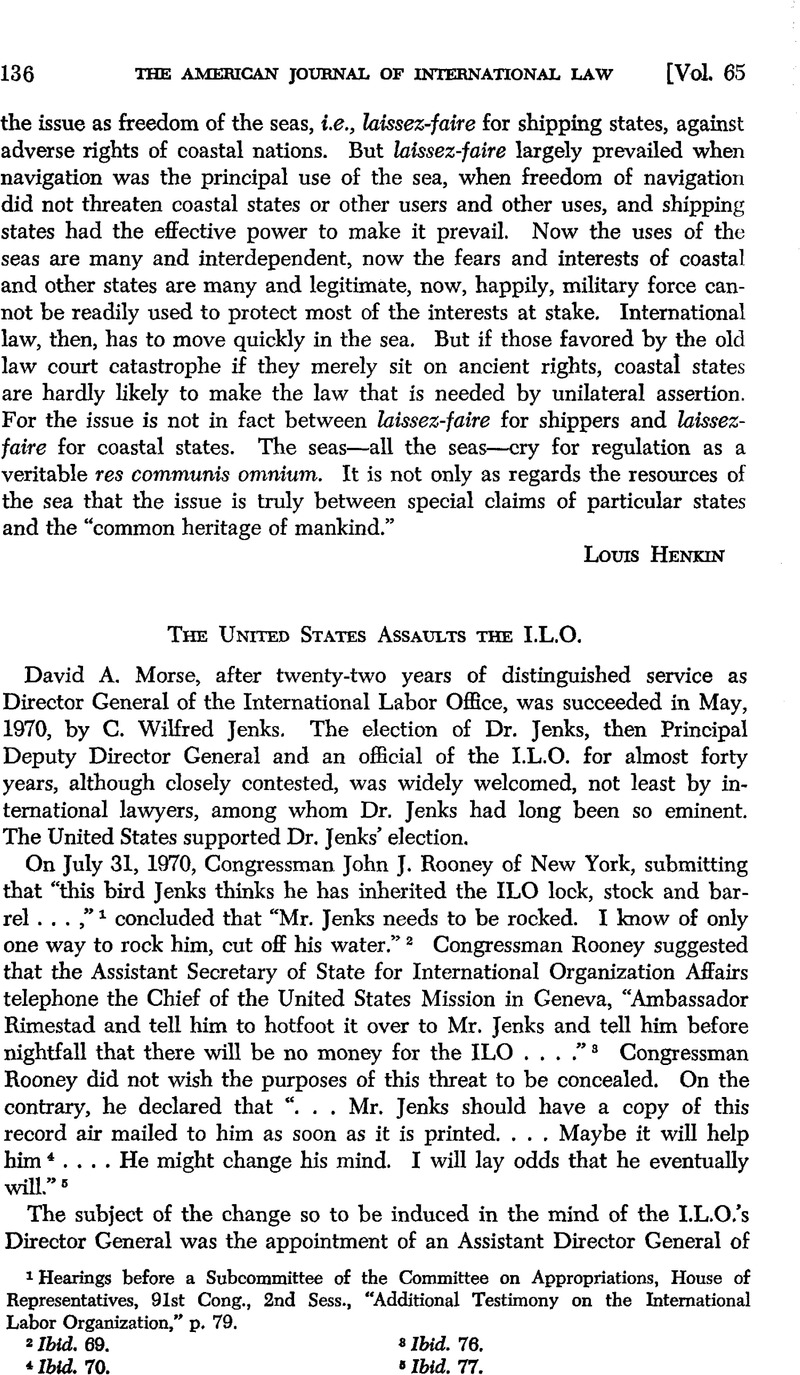Published online by Cambridge University Press: 28 March 2017

1 Hearings before a Subcommittee of the Committee on Appropriations, House of Representatives, 91st Cong., 2nd Sess., “Additional Testimony on the International Labor Organization,” p. 79.
2 Ibid. 69.
3 Ibid. 76.
4 Ibid. 70.
5 Ibid. 77.
6 Ibid. 71.
7 Ibid. 59, 68–69. Mr. Hildebrand preferred the threat of withholding payment of U.S. assessments to actual withholding (ibid. 76). The representative of the Department of State, Samuel De Palma, Assistant Secretary of State for International Organization Affairs, opposed deletion of appropriations for the I.L.O. (at pp. 74–75, 78).
8 Ibid. 5, 59.
9 Ibid. 70.
10 Ibid. 59, 66.
11 Ibid.
12 Ibid. 75.
13 Congressional Record, Senate, Aug. 24, 1970, at S14103.
14 Ibid, at S14094.
15 Ibid, at S14097.
16 Ibid, at S14098.
17 Ibid, at S14103.
18 Ibid, at S14105.
19 Ibid, at 14106.
20 Ibid.
21 Ibid.
22 Congressional Record, House, Oct. 6, 1970, at H9622–9633. Congressman Rooney then stated “that we belonged to an organization that has become dominated by Communists. It is now nothing but a stage for Communist propaganda, and there is no reason why our taxpayers should be paying 25 percent of every dollar of cost of keeping that organization alive.” (At H9623.) In response to Congressman Frelinghuysen’s statement that the reduction in the appropriation would cause “a default by the United States on an assessment which has already been levied against it,” Congressman Rooney replied “There is not any question about that. That is exactly what we want to do, is it not?” (at H9631).
23 Art. 9, pars. 4 and 5.
24 Art. 2, par. 5.
25 [1962] I.C.J. Rep. 158,164; 56 A.J.I.L. 1053 (1962).
26 “. . . [We] must make it crystal clear that if any member can insist on making an exception to the principle of collective financial responsibility with respect to certain activities of the Organization, the United States reserves the same option to make exceptions if, in our view, strong and compelling reasons exist for doing so. There can be no double standard among the members of the Organization.” Ambassador Arthur J. Goldberg, in an address to the United Nations Special Committee on Peacekeeping Operations, Aug. 16, 1965, U.N. Doc. A/AC.121/PV.15, pp. 3–15; reprinted in 53 Dept. of State Bulletin 454, 456 (Sept. 13, 1965); excerpted in 60 A.J.I.L. 104 at 106 (1966).
27 See “Article 19 of the Charter of the United Nations: Memorandum of Law,” by the Office of the Legal Adviser, Department of State, in 58 A.J.I.L. 752, 772–776 (1964).
28 Nevertheless, the International Labor Organization in 1946 extended a warm invitation to the U.S.S.R. to rejoin the I.L.O. The employers’ representatives noted that the existing I.L.O. Constitution had permitted the appointment of a representative “of socialized management when the U.S.S.R. was a Member of the Organization. . . . If the U.S.S.R. resumed membership of the Organization, and the Employers’ representatives shared the general desire that it should do so, it would naturally appoint as Employers’ delegate a representative of the socialized management of the U.S.S.R.” The Conference Delegation on Constitutional Questions unanimously concluded that “appropriate provision for the representation of socialized management and of different sections of the labour movements of Member States can be made within the framework of the present system of representation . . .” Report II (1), pp. 91–94, quoted in International Labor Organization, Record of Proceedings of the 29th International Labor Conference, 1946, pp. 358–359.